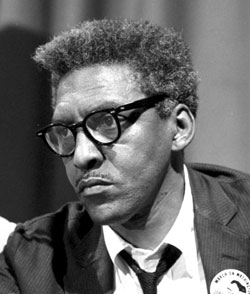“History is not the past. It is the present.” — James Baldwin
The Black/Latinx Employee Resource Group honors Black History every month and wants to highlight significant individuals who have been instrumental in advancing equity and justice in the Black community but have received little recognition. We recognize the importance of acknowledging our shared history, so we do not repeat the mistakes of the past as we move to a freer and more liberated world.
Bayard Rustin (1912-1987)
Bayard Rustin was a close advisor to Martin Luther King, Jr.
 He was the key organizer for the 1963 March on Washington for Jobs and Freedom. However, he did not receive the recognition he deserved and was relegated to behind the scenes due to him openly living his truth as a gay man.
He was the key organizer for the 1963 March on Washington for Jobs and Freedom. However, he did not receive the recognition he deserved and was relegated to behind the scenes due to him openly living his truth as a gay man.
Rustin was born on March 17, 1912, in West Chester, Pennsylvania. He was raised by his grandparents, who instilled the Quaker values of peace and nonviolence. In 1941, Rustin’s longtime mentor, A. Philip Randolph, assigned him as youth organizer of the proposed 1941 March on Washington. During this time, Rustin organized several campaigns and led workshops on nonviolent direct action as a member of the Fellowship of Reconciliation (FOR) and co-founder of the Congress of Racial Equality (CORE).
Rustin was arrested for his vocal opposition to World War II and for protesting segregation laws in the Jim Crow-era South. In 1953, he was arrested and jailed on a “moral charge” for having sex with men. This arrest did not stop Rustin’s organizing efforts and advocacy to advance the civil rights of the Black and gay communities.
From 1965–1979, Rustin served as the head of the A. Philip Randolph Institute, the AFL-CIO's African American constituency group. Serving alongside A. Philip Randolph until his passing in 1979, Rustin worked to integrate unions and promote unions among African Americans.
Rustin served on several humanitarian missions to Vietnam, Cambodia and Haiti during the 1970s and 1980s. In the 1980s, he became a part of the LGBTQ+ movement and an advocate for AIDS education. In a 1986 testimony on behalf of New York State's Gay Rights Bill, Rustin stated that “gay people are the new barometer for social change.” He felt that injustice everywhere should not be tolerated and must be protested. He died August 26, 1987, as the result of a perforated appendix.
In 2013, President Obama posthumously granted the Award of Freedom. Gavin Newsom, the governor of California, pardoned Rustin for his Pasadena conviction in 2020.
Rustin’s legacy lives on through the Bayard Rustin Center for Social Justice.
References:
- https://www.nyclgbtsites.org/site/bayard-rustin-residence/
- https://nmaahc.si.edu/bayard-rustin
- https://kinginstitute.stanford.edu/rustin-bayard
- Google search for Bayard Rustin
-- Submitted by Crystal N. Dunivant, M.S.W., L.S.W., Black/Latinx Employee Resource Group
Photo credit: Leffler, W. K., photographer. (1963) Bayard Rustin at news briefing on the Civil Rights March on Washington in the Statler Hotel, half-length portrait, seated at table / WKL. Washington D.C, 1963. [Photograph] Retrieved from the Library of Congress, https://www.loc.gov/item/2003688133/.